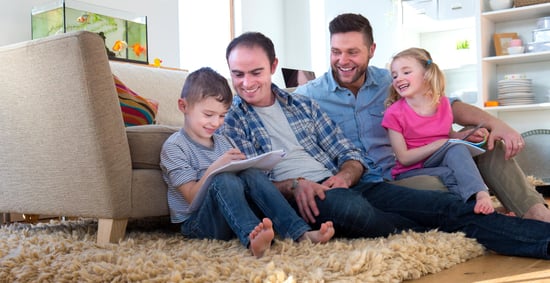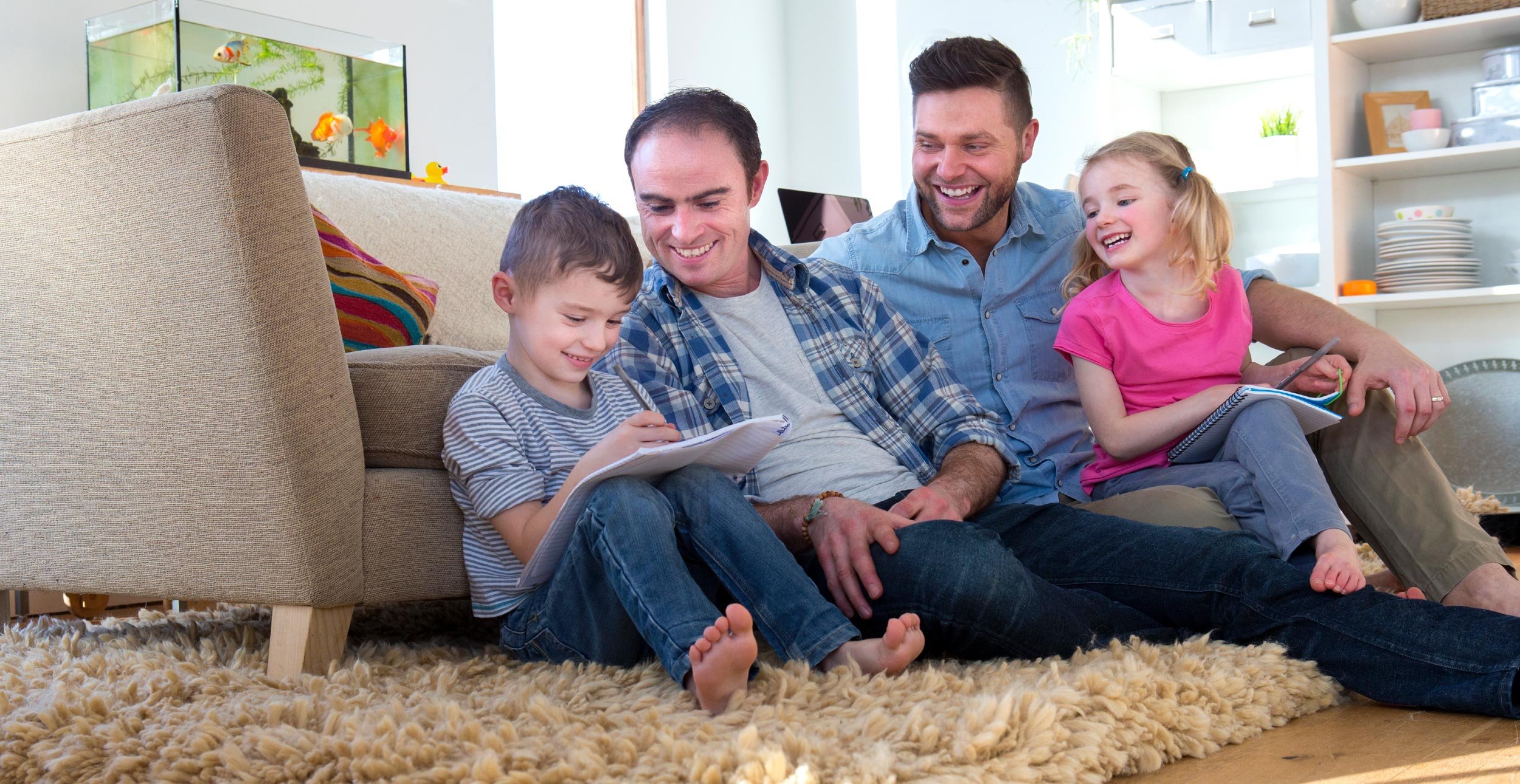

The New Year is in full swing and it’s safe to say that by this point two things are clear to LGBTQ parents: First, getting your kids up and ready for school is not easy when it’s still dark at wake up time. And if you live in the Northeast like us, add snow boots and long johns to the mix!
Unfortunately the second thing that is clear is even more frustrating to say the least: Our LGBTQ families are already under attack by clerks, governors, state legislators, and presidential candidates. Last year’s many wins for equality were not the end of our fight. Those of us doing this work professionally have been beating this drum for years, but it can be overwhelming and hard to understand what we’re facing.
What Does the Future Hold for LGBTQ Families?
So what does 2016 look like for families with LGBTQ parents? Here it is in five categories:
1. Marriage Equality
Marriage equality doesn’t solve everything for LGBTQ families, and it’s under attack despite the Supreme Court decision. The challenges are real, and point to the deeper issue that the country we are raising families in is one in which it is acceptable for politicians and other leaders to advocate for discrimination against families like ours. In Alabama clerks are still refusing to obey the Supreme Court’s decision in Obergefell, and are refusing to grant marriage licenses. Some states are looking at proposed legislation that would attempt to find ways around the 14th amendment to deny marriage. Will they succeed? No. But don’t underestimate the threat of this being an acceptable proposal and public discussion.
2. Adoption
Despite our success in marriage, that success does not solve all of our issues related to adoption. It is true that in most cases legally married couples now can adopt together. But this is still a critical issue to all of us regardless of how our families were formed: surrogacy, donor insemination, foster care, private adoption. You should care about adoption laws! Yes, even if you haven’t and won’t be adopting. Why? Because in most of these cases, especially when there is more than one parent involved, adoption is the means through which we legally secure a child’s relationship with an adult, allowing them to be protected and supported fully by that adult and the government systems around them.
Check out this map of foster and adoption laws state by state!
The issues we’re facing with adoption are not just the ability to adopt in all cases, but also in assuring that those adoptions are secure. A recent case in Virginia Beach, VA illustrated well an all too common threat to our families, where the legal relationship of a non-bio parent to a child after a breakup/divorce can be challenged (not just custody.) Cases in the past couple of years have illustrated this, both when the non bio-parent has formally adopted the child and when they haven’t because adoption wasn’t available or because it was unknown to be necessary.
In one recent case in Alabama, a judge invalidated a previous adoption granted years earlier in Georgia on the basis that Georgia’s lack of marriage equality at the time meant that it had no jurisdiction to grant the adoption, the two of which are not actually linked. Ultimately, this ruling was overturned, but the very idea that adoption can, in and of itself, be overturned, should frighten all Americans. Adoption is meant to legally cement the parent-child relationship, providing protections that all children and families need.
And perhaps most insidious, in many parts of this country adoption and foster agencies can still discriminate against prospective parents, which is not actually different from discriminating against the kids themselves. Every wanting, willing, and capable parent who wants to adopt and/or foster our nation’s most vulnerable children must be welcomed and considered. There is a lot of work to do to improve adoption and foster care in this country. Certainly one easy step is ensuring kids have the best possible opportunity to find a loving home and not turning away qualified parents.
3. Surrogacy and Assisted Reproductive Technologies (ART)
Surrogacy should be legalized where it’s illegal, regulated where there is a lack of regulation. We are blessed to live in a time when many options are available to those seeking to have families but can’t conceive in the “traditional” way. But not all states have legalized surrogacy, and many more have not adopted laws to ensure the protection of all parties involved. I couldn’t count the number of families I know who have been created through surrogacy or other ART. And yet there are unnecessary challenges at every turn, including proper protections for all parties, and the standardization of how insurance companies deal with families using ART. There are two cases currently headed up the chain, potentially to the Supreme Court, in which there is disagreement over who makes decisions in surrogacy cases where tough choices have to be made. We need to continue to push to ensure we can access all medically safe choices and do so in the best ways possible. And we need to make sure everyone who provides related services, from doctors to agencies, to psychologists, social workers, lawyers, and judges- that they are all trained to work with our families.
4. LGBTQ Discrimination
While securing and creating our families is an ongoing process and area of difficulty, our families also face discrimination in a variety of other ways, as well as the lack of protection against this discrimination, in far too many corners of America. So far in 2016, we already know of over 100 anti-LGBTQ bills and proposals across the US. These range from religious freedom restoration acts to allowing discrimination based on the religious beliefs of both individuals and corporations, to new so-called first amendment defense proposals that use the approach of relying on freedom of speech as a defense for bigotry. There are also a variety of bills that make our schools and communities unsafe for those of us who are in the trans or gender nonconforming communities, including a recent bill that would allow school administrators to check the genitals of students.
These attacks were expected, and most will not succeed. But we can’t risk the possibility that they will. We must educate the public, educate our leaders, and fight at every step.
5. Lived Equality
Beyond legal attacks on our community specifically because of gender identity or sexual orientation of our family members, our communities are unsafe because of the color of our skin, our economic status, religion or immigration status. To fully protect our families, in a climate in which the color of our skin can still determine our safety on the streets of our hometowns, we must be proactive in fighting racism and xenophobia of all kinds. We need more competent providers of healthcare and education, in both the private and government sectors, that address these issues. And we need to dismantle the systems that make it so that our experiences are so radically different just because we or our children look different.
We need to create a world that can protect and support our children. Our teachers, school systems, pediatricians, and all professionals that touch our children’s lives need to understand our families, how we come to be, how our children have complicated and beautiful origin stories that impact their medical histories, their place in a family tree, and what they deal with as they grow up and as they explore their own history and family. As one of my colleagues likes to say, there’s never too many people to love and to love you - but all of these systems all too often assume our children have two straight parents with whom they share genetics - and fewer still know what it means to truly embrace our stories, our sperm or egg donors, our surrogates, our first/birth families, our surrogates, and on and on.
The uniqueness and blessing of the LGBTQ population is that we are born everywhere—of every color, of every opportunity, of every religion—and then we come together to form families that are the most diverse families on record. We therefore have the opportunity, experience, and moral obligation, no matter our individual family’s characteristics, to join together in improving our communities and creating a safer country for everyone.
Head over to the Movement Advancement Project’s website and poke around. There is not one state that doesn’t have work to do. And even if the laws in your state protect you personally, remember that we have to protect each other, and protect our children. All of our children. Let’s protect the next generation and make our legacy that of a generation of families that stood up, together, to put children first and create a world where the next generation can be their true selves and all of the beauty and messiness that that entails.
Gabriel Blau is a dad, husband, and a nationally acclaimed LGBTQ family rights advocate and strategic advisor to nonprofit organizations. His family is adopted, multiracial, and really into good food and great books.
